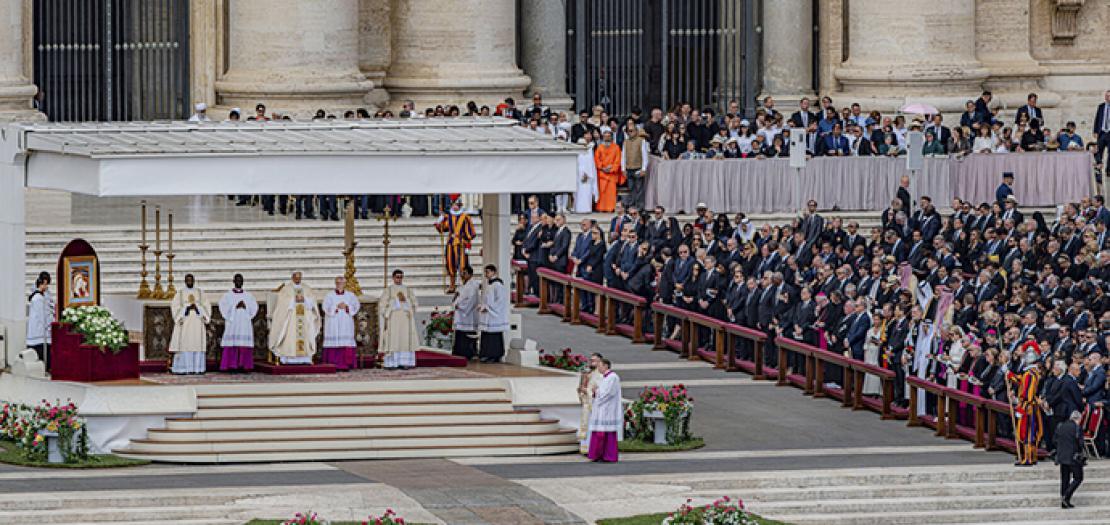Issued by the Catholic Center for Studies and Media - Jordan. Editor-in-chief Fr. Rif'at Bader - موقع أبونا abouna.org
International Mosaic at the Vatican
People came from every corner of the world to attend the inauguration Mass of His Holiness the new Pope, an event known in ecclesiastical language as the beginning of the Petrine Ministry of Pope Leo XIV.
Noteworthy was the extraordinary international presence, as the Vatican received more than 200 official delegations from numerous countries that maintain friendly relations with the Vatican, that is, with the Holy See, the name adopted by international diplomatic convention. Present as well were representatives of various religions, which also maintain relations of friendship and interfaith dialogue with various ecclesiastical institutions, particularly through cooperation with the Vatican's Dicastery for Interreligious Dialogue. On the other hand, representatives of the Catholic Churches also joined the Eastern Catholic Patriarchs, as did sister churches, particularly the Orthodox, Oriental Orthodox, and Evangelical Churches.
It was also striking how His Holiness the Pope was moved when he put on the papal Pallium, the sign of communion with all the churches, as well as the ring known as the Fisherman's Ring or the Ring of Saint Peter. With eyes welling with tears, he accepted the ring from his assistant, Cardinal Tagle, to begin his new papal term, succeeding not only the great Pope Francis, but also all the popes of the 20th and the 21st centuries, each of whom left a special mark. Significantly, he took the name of the first pope of the 20th century, Leo XIII, the founder of the Church's social teaching, the defender of the poor and the vulnerable, as well as the advocate for equality between men and women in terms of rights and duties. Leo XIII was known as the source of inspiration for Social Justice, which Pope Leo XIV spoke about at length in his homily at the first Mass, when he pointed out that his policy would always be to promote justice, upon which peace is naturally built.
The words of the new power were particularly moving when, at the end of the Holy Mass, he made his first appeal, with Gaza taking center stage, saying, "We cannot forget our brothers and sisters who are suffering because of war. In Gaza, the surviving children, families, and elderly are reduced to starvation.” The event was, of course, attended by all influential figures in the international arena and representatives of major and friendly countries directly involved in ending the conflict and halting the famine.
Notable was the presence of His Highness Prince Ghazi ibn Muhammad, personal advisor to His Majesty the King for religious affairs. This was the first meeting between Prince Ghazi and His Holiness the Pope, on behalf of His Majesty King Abdullah II, and consequently on behalf of the extended Jordanian family. The meeting took place in the context of the inauguration Mass of His Holiness the Pope, who will undoubtedly work with His Majesty the King and Jordan to develop diplomatic and friendly relations, as well as cooperation between the Hashemite Kingdom of Jordan and the Vatican.
On the Wednesday following the Sunday mass, I had the pleasure of meeting Pope Leo. I mentioned to him that I was the spokesperson of the three most recent papal visits to Jordan and that we now look forward to another papal visit, which would be the fifth in the modern history of Jordan. Smiling, he said in Italian: Speriamo, we hope.
Congratulations to the Catholic Church for all the sublime arrangements that took place the last weeks, including the Feast of Easter, the funeral of Pope Francis, then the election of the new Pope, and the accompanying massive presence of press and media, as 6,000 journalists and media personnel from around the world were present at the inauguration Mass, demonstrating that news from the Catholic Church continues to have its influence, presence, and impact on the international arena and not only within Catholic communities around the world.
Going back to the Pope's first words with reference to his call to build bridges, I am sure that there will be strong bridges of relations with the members of the extended Church—a spirit which is now known in the Church as the synodal spirit—as well as with other sister Churches, especially in view of the
upcoming 1,700th anniversary of the Council of Nicaea, which established the Creed adopted by all Churches, in addition to extending cooperation with all religions, supporting and upholding the standard of religious dialogue to higher levels, as well as diplomatic and humanitarian cooperation with countries and organizations that enjoy diplomatic relations with the Holy See. As the choir chanted in Greek during the papal inauguration, we say to His Holiness the new Pope: “Many Years to you, Master.”







